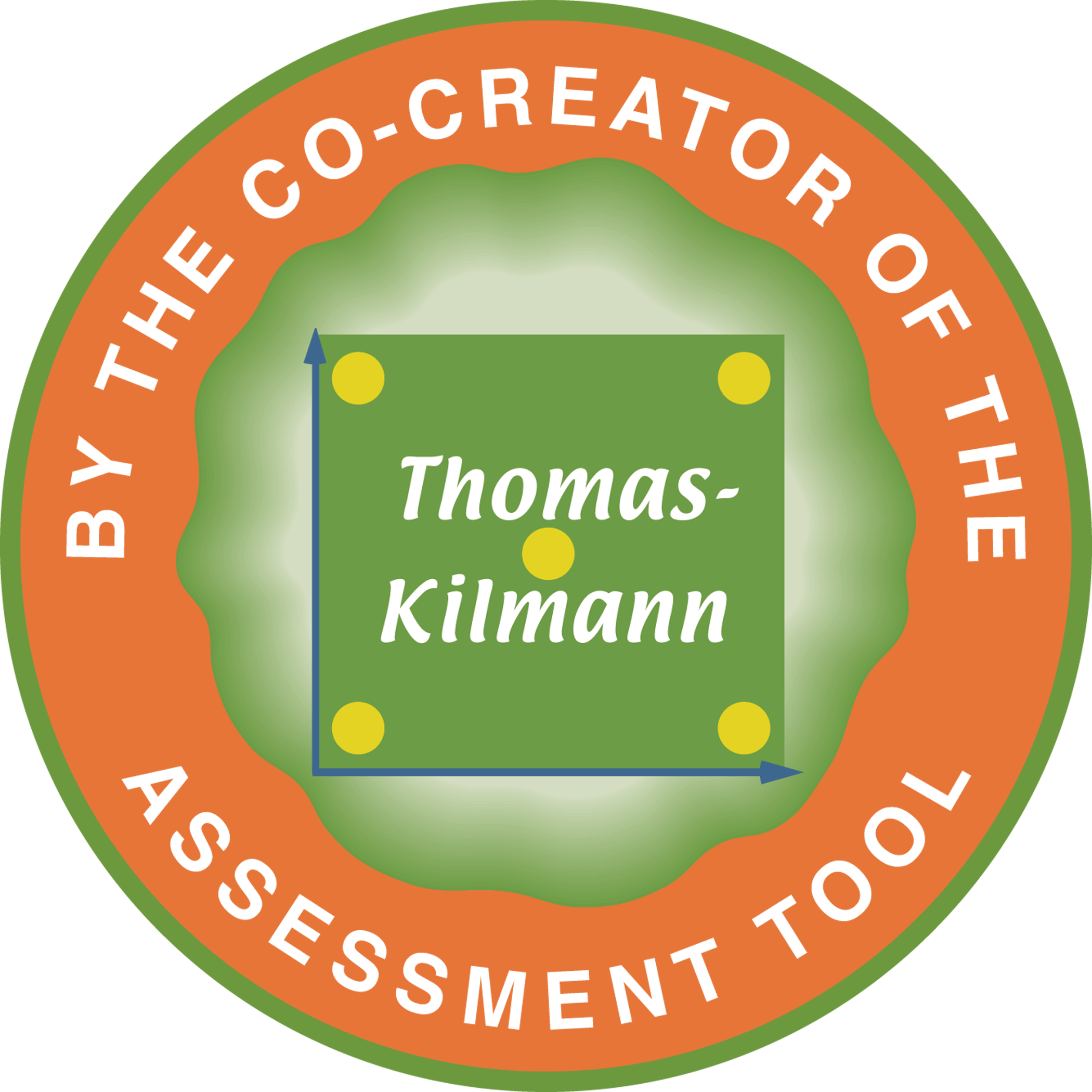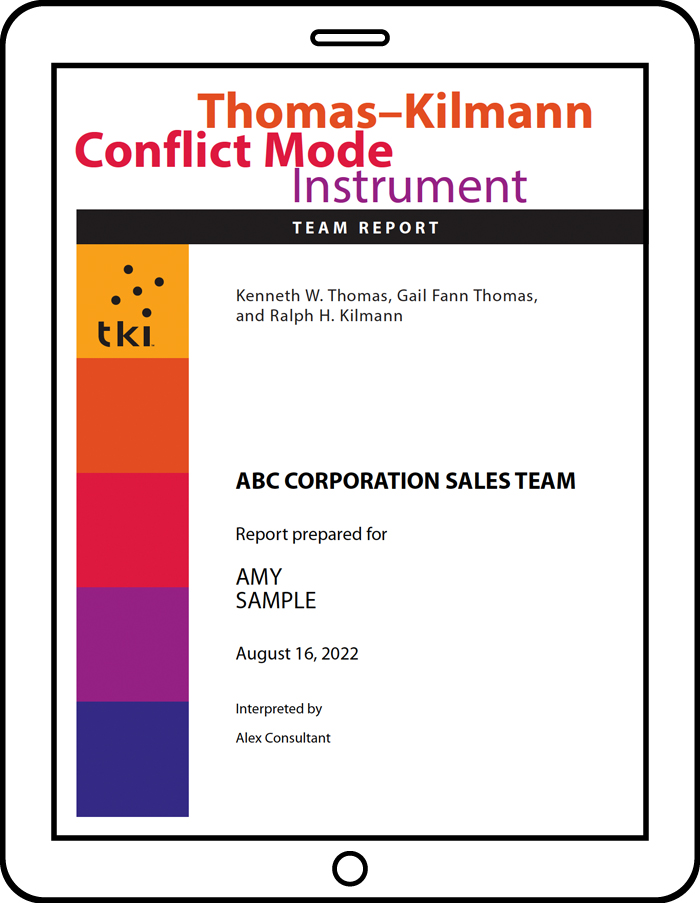16 Sep Presenting the New TKI Team Report: Identifying Challenges and Remedies for Resolving Your Team Conflicts
Ralph H. Kilmann, co-author of the Thomas-Kilmann Instrument (TKI)

I’d like to share with you the first new TKI product to appear in a very long time. First, I’ll provide a summary of why Ken Thomas, Gail Thomas, and I developed the TKI Team Report after so many decades of providing the TKI assessment only for individuals, devoid of any specific team or group context. Second, I’ll suggest how this new online report can help all kinds of groups and teams improve their conflict-handling behavior. In essence, the TKI Team Report can help couples, families, business partners, workgroups, departments, and cross-functional teams significantly improve their performance and satisfaction.
And third, I’ll share some specific guidelines for helping you decide WHEN to use the new TKI Team Report instead of habitually proceeding with the long-standing practice of merely averaging team member’s conflict mode scores, as presented on their individual TKI Profile and Interpretive Report, or what we will now simply call, the TKI INDIVIDUAL Report… in contrast to the new TKI TEAM Report. In the process, I’ll also suggest when it’s beneficial to modify the standard TKI instructions, so that team members will respond to each of the 30 A/B items on the TKI assessment in terms of their behavior in their designated team and not their behavior in general (without specifying any situation at all).
Let’s begin: It should be apparent that teams have become the building block of today’s organizations—given the highly complex problems and challenging conflicts that are increasingly propelled from our global village. We have learned that effective teamwork can increase engagement, boost innovation, and improve productivity for every team member, for the team as a whole, for the entire organization, and even for the international economy. Naturally, effective teamwork is also vital in many other social settings in life. In fact, ANY intact group of a manageable size can benefit from using the new TKI Team Report to examine its conflict-handling behavior.
Indeed, studies show that a team’s ability to manage conflict is one of the most important factors that consistently affect its performance. With this important finding clearly in mind, the TKI Team Report is designed to help members learn how to transform their unique CHALLENGES in addressing team conflicts into some very practical REMEDIES for significantly increasing both individual and team performance.
I’ll now outline how you can create a personalized TKI Team Report for every member on your designated team, based on every member’s responses to the TKI assessment tool, either using the TKI’s standard instructions or perhaps modifying those standard TKI instructions. In a little while, I’ll say more about when it’s best to modify the standard TKI instructions and exactly HOW to modify those instructions in order to focus members’ attention exclusively on their designated team.
As usual, it will take each team member about 15 to 20 minutes to respond to all 30 A/B items on the individual TKI assessment—using a computer, laptop, or mobile device. After every team member has completed their individual TKI, the leader and/or facilitator can request that we, at Kilmann Diagnostics, email them a compressed zip file that contains each member’s personalized TKI Team Report. Just to be clear: Each TKI Team Report is unique to each member, since that report not only presents which of the five conflict modes are most and least used for the team as a whole, but each TKI Team Report also includes that member’s own individual tendency to use some conflict modes too much and other conflict modes too little. In fact, it’s always illuminating to discover the striking differences between a team member’s personal preferences for using the five conflict modes in comparison to the entire team’s preferences for using certain modes more than others. Such individual/team comparisons will help you identify the particular CHALLENGES each member faces (including the team as a whole) in improving the results of their conflict management behavior.
To enable you to make the best use of the TKI Team Report for all kinds of intact groups that are made up of 2 to 15 or so members, the three co-authors have created a FREE Facilitator’s Guide, which you can download at your convenience. In addition, you can also download a Sample TKI Team Report, so you can review exactly what is provided in this new report and how various individual/team comparisons can pinpoint how members can improve their team functioning and thus their team’s performance.
I’ll now provide you with some more relevant background information about the new TKI Team Report.
If you are a facilitator, trainer, consultant, coach, therapist, ombudsman, or mediator who wishes to improve the conflict-handling behavior of a clearly defined group of 2 to 15 or so members AND the members of that clearly defined group have already been interacting with one another for quite some time, then the TKI Team Report may well be the perfect choice for a learning and development program. But if you are working with a community of more than 15 or so individuals, let alone 25 or many more individuals, AND if those individuals rarely, if ever, have interacted with one another in a work situation or in some other setting, it’s probably best to make use of the TKI INDIVIDUAL Report that only provides feedback for the one respondent who completed the TKI assessment.
I’ll now say more about why you might want to modify the standard TKI instructions for producing a TKI Team Report in order to focus each member’s attention only on the interactions that take place inside a designated team — instead of using the standard TKI instructions, which do not specify any situation at all.
Here are the standard instructions for taking the TKI assessment tool:
“Consider situations in which you find your wishes differing from those of another person. How do you usually respond to such situations?”
The respondent is then provided with this additional instruction:
“The following pages contain 30 pairs of statements describing possible behavioral responses. For each pair, please select the letter (A or B) of the statement that best characterizes your behavior.”
As you can tell from these standard TKI instructions, no situation is specified, which is the best approach when the individuals who are taking part in some educational program want to learn more about their own, individual conflict-handling behavior and, for the time being, are not at all concerned about any specific situation, whether at work or at home.
However, instead of always using those general-purpose instructions of the TKI assessment, you can MODIFY those instructions so the 2 to 15 or so members of a designated team, who have been interacting with one another for quite a while, will respond to the TKI’s 30 A/B items according to how they address conflict INSIDE their designated group—and that designated group only.
Here’s just one example of MODIFIED instructions to the TKI assessment tool, which explicitly names the one team that is the sole focus of member responses to those 30 A/B items:
“Inside the Project Team Alpha in the Finance Department, how do you usually respond when you find that your wishes differ from those of other team members?”
Next to the team’s name in these modified instructions, you might also want to list the names of all team members, just so there will never be any doubt about the exact composition of that team. Most importantly, by having each team member focus exclusively on their behavior in that particular team, the TKI results will be more accurate, since member behavior in all OTHER social settings can no longer dilute, let alone distort, the assessment of only that team’s conflict-handling behavior. By the way, we only modify the TKI instructions to show the full name of the team and perhaps list all of its members; we never change any OTHER significant words or phrases in the standard TKI instructions, since the other parts of those instructions are essential for maintaining the validity of the TKI assessment tool.
Lastly, after you’ve purchased a TKI Report for every member on your team, you can then download the KD_Spreadsheet for Creating Group Accounts, which asks your to list the first name, last name, and email address of each team member. After you email us your carefully completed spreadsheet, we ask you to let us know your preferences for these four services, which Kilmann Diagnostics provides for every quantity purchase of the TKI Team Report:
1. The date, time, and time zone when you want us to import your spreadsheet, which initiates the TKI taking process for your team members.
2. If and when you want us to send a Reminder Email to only those team members who have not yet completed their TKI assessment.
3. If and when you want us to email you 1 Status Report that lists the team members who have—or have not—completed their TKI assessment.
4. After each of your team members has completed their individual TKI assessment, let us know when you would like to receive, via email, a compressed zip file that includes all your team members’ personalized TKI Team Reports—so you can give each member their personalized report, either through an email or in person, just before the start of your training, consulting, coaching, or other educational program.
I hope I’ve provided you with some very useful background information about WHY Ken, Gail, and I created the TKI Team Report and HOW the TKI Team Report can not only help you identify the particular OBSTACLES to managing conflict successfully in that clearly designated team, but can also recommend several practical REMEDIES that will likely improve the team’s performance and satisfaction.
Kilmann Diagnostics offers a series of eleven recorded online courses and nine assessment tools on the four timeless topics: conflict management, change management, consciousness, and transformation. By taking these courses and passing the Final Exams, you can earn your Certification in Conflict and Change Management with the Thomas-Kilmann Instrument (TKI). For the most up-to-date and comprehensive discussion of Dr. Kilmann’s theories and methods, see his 2021 Legacy Book: Creating a Quantum Organization: The Whys & Hows of Implementing Eight Tracks for Long-term success.





